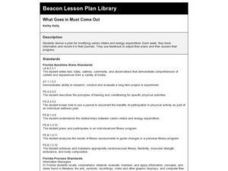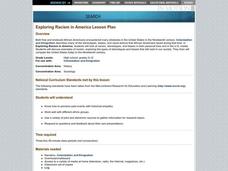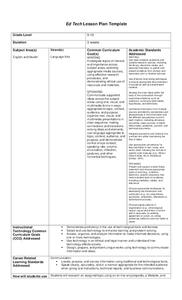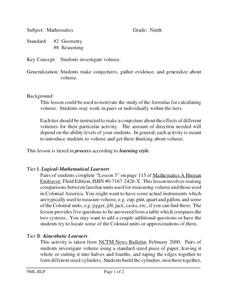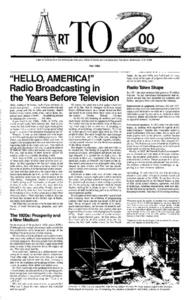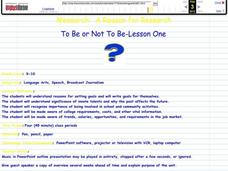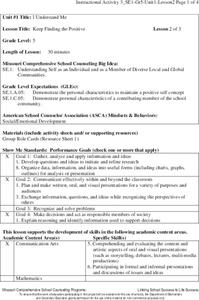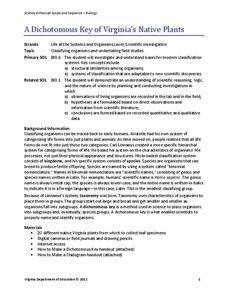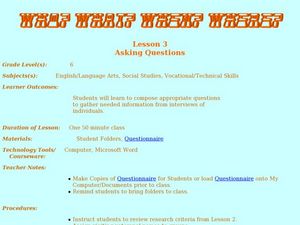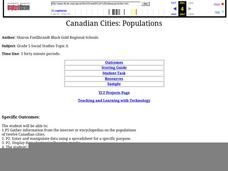Curated OER
Using Active Learning to Reinforce Mathematics
Students predict, then measure how far a bug can travel on a "course" over a specified amount of time, then construct graphs based on the data they acquire.
Curated OER
What Goes in Must Come Out
Students monitor their calorie intake and energy expenditure. They keep track of daily data in a journal and assess and adjust their diets as appropriate.
Curated OER
Exploring Racism in America
Students compare racism today to racism that existed during the nineteenth century. As a field research project, students individually keep track of examples of racism, biases, and stereotypes illustrated throughout the US media over a...
Curated OER
Causal Patterns in Density Phenomena
Students define density as a relationship. Through experimentation, they explore the association between the mass and volume of pure substances. Students create a data plot and analyze the patterns between mass and volume. Students...
Curated OER
Ed Tech
Students access and evaluate authority of electronic resources. They synthesize data from multiple sources. Students compose a Works Consulted page. They prepare and deliver an informative speech on a disease or medical condition.
Curated OER
Superhumans and Bionics: Building Hi-Tech Exoskeletons
Young scholars explore how the body works. Students experiment and participate in activities to compare speed to stride length. Using the data collected, young scholars draw conclusions about the biology of dinosaurs, their speed and...
Curated OER
Forecasting Weather
In this weather worksheet, students review the different things a meteorologist studies and how they collect weather data. Students compare weather watch and weather warning. This worksheet has 10 matching and 3 short answer questions.
Curated OER
Investigating Volume
Ninth graders investigate and make conjectures about volume. In this geometry lesson, 9th graders analyze data and predict the outcome. They calculate volume using different tiers.
Curated OER
Radio Broadcasting Before Television
Students compare the radio to other forms of mass communication. In this Radio Broadcasting Before Television instructional activity, students learn the different types of radio shows in the 1920s and 30s. Students write and perform...
Curated OER
To Be or Not to Be
Students gather information about setting goals through a variety of activities. In this setting goals lesson, students view a PowerPoint that explains the outcomes of the project, take notes, interview a local business person, write a...
Missouri Department of Elementary
Keep Finding the Positive
Group members take on roles to create a positive classroom community. Learners perform their role—leader, recorder, presenter, timekeeper, encourager, and collector—in preparation for a formal presentation of their positive thinking...
Teach Engineering
Start Networking!
Class members create their own social networks by collecting signatures before graphing the interactions with their fellow classmates. The degree distribution of the simulated social network is determined by calculating the degree of...
Laboratory for Atmospheric and Space Physics
Jupiter’s Relative Size
How do you properly illustrate the extreme size difference between two planets—Earth and Jupiter? With the help of jellybeans, of course! Create a scale model of Jupiter's mass compared to Earth using a fishbowl, 1,400 beans, and a...
University of Colorado
Rings and Things
Galileo first observed Saturn's rings in 1610. Through the use of a flashlight and baby powder, classes see how they can observe the rings of the outer planets from far away. Another demonstration shows how these rings, made of ice and...
Virginia Department of Education
A Dichotomous Key of Virginia’s Native Plants
Can your class correctly classify plant species? Individuals explore native plants of the local environment and correctly classify them into their respective categories. They investigate differences in the plants and discuss similarities...
Kenan Fellows
Microorganisms in Pond Water
That is living in the water? Groups of two to three view pond water with microscopes in order to find microorganisms. They draw pictures of the ones they find in their slides. The groups compare their drawings to pictures of common...
California Education Partners
Summer Olympics
Quickly get to the decimal point. The last assessment in a nine-part series requires scholars to work with decimals. Pupils compare the race times of several athletes and calculate how much they have improved over time. During the second...
NOAA
Earth Origami
After reading a brief history of Carl Skalak's journey on the open waters, scholars make a three-dimensional model of the Earth out of an Origami balloon using a printable decorated as the Earth.
Curated OER
The Ultimate Classroom: R & D
Redecorate a classroom on a budget. Middle schoolers rebuild a classroom after a disaster. They conduct Internet research to determine construction supplies needed and the most cost effective way to reach the predetermined results. They...
Curated OER
Who? What? When? Where? Asking Questions
Sixth graders interview Veterans or role play to answer who, what, where, when questions. In this Veteran's Day questioning activity, 6th graders learn about the events in the military service of veterans. Students may simulate...
Curated OER
Reporting from the Front Lines
Students examine the battle of Gettysburg as they write news articles. In this Battle of Gettysburg lesson, students become familiar with the job of the news reporter as they report on the events of the Battle of Gettysburg as they...
Curated OER
Canadian Cities
Fifth graders gather population data on twelve cities in Canada. They present the information on a spreadsheet and sort the data on two different types of graphs. They create a generalization for the data that they collected.
Curated OER
Element Investigation
Students examine the process for gathering information about an element using at least three Internet websites. They gather the data about the element on a investigation worksheet which is graded using a rubric.
Curated OER
Lest We Forget
Students engage in historical and community research to discover facts about those who served in the First World War. Names of service persons are collected from a variety of sources and research skills applied to gather and publish the...
Other popular searches
- Data Gathering
- Science Data Gathering
- Data Gathering Strategies
- Gather and Organizing Data
- Gather and Organize Data
- Gathering Qualitative Data
- Data Gathering Tests
- Gathering and Charting Data
- Math Data Gathering
- Math, Data Gathering
- Gather Solar System Data
- Gathering Weather Data

